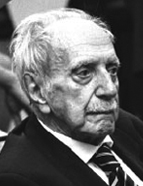

France’s presence was marked in different fields. At the University, without prejudice to his administrative work, he was above all a professor of popular classes and a sought-after thesis advisor, a task in which he particularly enjoyed himself. In the field of historiography, contributing to bringing to Brazil the problematising view of the Annales group, he played an important role in affirming history as a science of man and in rejecting deterministic and schematic views. As a researcher primarily concerned with Brazil, he was interested in understanding the unique characteristics of Brazilian society, rather than simply reproducing imported models. This is why he valued the historical situations mentioned above, such as the fazenda, which he refused to reduce to the American plantation or the Castilian hacienda, and the institutional figure of the capitão-mor regente, which he did not see occurring in Portugal.
His repeated assertion that history was the “science of man” embedded a humanistic and democratic perspective. His deep identification with the University of São Paulo reflected not only a scientific, cultural and educational ideal, but also a political one, which mobilised the elites and intellectuals of São Paulo after the defeat of the Constitutionalist Revolution of 1932, in which the young França participated as a soldier, to found the University as a reaction to the status quo in the country.
Eduardo d’Oliveira França participated in scientific institutions such as the Instituto de Estudos Valeparaibanos [Institute of Valeparaibanos Studies], the Sociedade Brasileira de Pesquisa História [Brazilian Society for Historical Research], the Associação Nacional de Professores Universitários de História [National Association of University Professors of History], the Instituto Histórico e Geográfico de São Paulo [Historical and Geographical Institute of São Paulo], the Academia Paulista de História [Paulista Academy of History], the Instituto Histórico e Geográfico Brasileiro [Brazilian Historical and Geographical Institute], and the Academia Portuguesa da História [Portuguese Academy of History].
This work is financed by national funds through FCT - Foundation for Science and Technology, I.P, in the scope of the projects UIDB/04311/2020 and UIDP/04311/2020.
